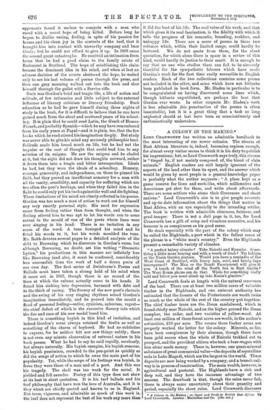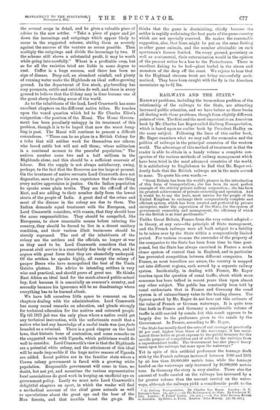A COLONY IN THE MAKING.*
LORD CRANWORTH has written an admirable handbook to the most interesting of our newer colonies. The stream of East African literature is, indeed, becoming copious enough, for almost every visitor seems to think it is his duty to publish his impressions; but, as Lord Cranworth says truly, this stream. is " tinged by, if not mainly composed of, the blood of slain
animals." English readers are still largely ignorant of the aspects of the land other than its sport, and the answer which would be given by most people in a general-knowledge paper is probably what the author suggests : "A place kept as a game reserve for lions and such-like, which millionaires and Americans get shot for them, and write about afterwards.
There are some settlers who stone their Governors and shoot natives." Lord Cranworth's aim is to give people accurate and up-to-date information about the things that matter in East Africa, with an eye especially to the intending settler.
The book is written with admirable clearness, fairness, and good temper. There is not a dull page in it, too, for Lord.
Cranworth has a gift of crisp and vivacious narrative, and his humour is as conspicuous as his good sense.
He deals especially with the part of the colony which may be called the Highlands, a part which in the fullest sense of the phrase is a " white man's country." Even the Highlands present a remarkable variety of climates.
"A perfect balmy climate ? Take Nairobi and Kyambu. Some- thing a little more bracing and with a touch of frost P Try Likipia or the ljasin Guishu plateau. Would you have a reminder of the West Coast of Scotland, with heavy rain, mist, and lovely days interspersed? The Mau or the Nandi Escarpment will give it you. A touch of the wind off the North Sea in East Anglia? The West Xenia, plains can do that. While for something really cold and bitter you must climb up into Kenia's glaciers."
Lord Cranworth deals at length with the natural resources of the land. There are at least two million acres of valuable timber in the Highlands, and one eminent authority has estimated that the forests of the Protectorate are worth twice as much as the whole of the rest of the country put together. The chief timber trees are the Ibean sandalwood, which is found chiefly near Nairobi, and on the higher ground the Ibean camphor, the cedar, and two varieties of yellow-wood. At least one million of these forest acres are worth, in the author's estimation, £10 per acre. The sooner these timber areas are properly worked the better for the colony. Minerals, so far, have been conspicuous by their absence, though there have been gold scares when the whole of Nairobi trekked out to prospect, and the provident citizen who took a beer-wagon with him alone made money. There is, however, one quasi-mineral
substance of great commercial value—the deposits of crystalline soda in Lake Magadi, which are the largest in the world. These deposits are now being worked by a company, and a branch rail-
way is in process of construction. The main wealth, however, is agricultural and pastoral. The Highlands have a rich and deep soil, and they have the immense advantage of two seasons. The drawback is that though the rains never fail, there is always some uncertainty about their quantity and period, especially the short rains. Lord Cranworth discusses
• A Colony in Ms Making ; or, Sport and Profit in British Best Africa. By Lord Cranworth. London : at: m I 1 ai a and Co. [12s. net.)
the several crops in detail, and he gives a valuable piece of advice to the new settler. " Take a piece of paper and jot down the incomings and outgoings which appear likely to occur in the suggested scheme, stating them as severely against the success of the venture as seems possible. Then multiply the outgoings and divide the incomings by two. If the scheme still shows a substantial profit, it may be worth while going into carefully." Wheat is a profitable crop, but so far all the varieties tried are liable in some degree to rust. Coffee is a huge success, and there has been no sign of disease. Deep soil, an abundant rainfall, and plenty of running water make the Highlands an ideal coffee-growing ground. In the department of live stock, pig-breeding has rosy prospects, cattle and ostriches do well, and there is every ground to believe that the Colony may in time become one of the great sheep-breeding areas of the world.
As to the inhabitants of the land, Lord Cranworth has some excellent chapters on the different native tribes. He touches upon the vexed question which led to Sir Charles Eliot's resignation—the position of the Masai. The Home Govern- ment has been peculiarly unhappy in its treatment of this problem, though it is to be hoped that now the worst bung- ling is past. The Masai will continue to present a difficult conundrum. "There can be no place in a British Colony for a tribe that will neither work for themselves nor others; who breed cattle but will not sell them; whose militarism is a continual menace to the peaceful population." The natives number some two and a half millions in the Highlands alone, and this should be a sufficient reservoir of labour. But the supply is not always satisfactory, owing, perhaps, to the fact that the Reserves are too large at present. On the treatment of native servants Lord Cranworth does not dogmatize, save to give his own experience that the one thing every native appreciates is justice. On the Indian population he speaks some plain truths. They are the riff-raff of the East, and are adding to their number daily from the lowest strata of the people of India. A great deal of the crime and most of the disease in the colony are due to them. The Indian demands equal treatment with the European, and Lord Cranworth considers, with reason, that they should bear the same responsibilities. They should be compelled, like Europeans, to show reasonable means before entering the country, they should be forced to live in a decent sanitary condition, and their various illicit businesses should be sternly repressed. The rest of the inhabitants of the colony are the settlers and the officials, no longer at war as they used to be. Lord Cranworth considers that the present civil service is a remarkably fine body of men, and he argues with great force that they are shamefully underpaid. Of the settlers he speaks highly, all except the colony of pauper Boers who have monopolized the best of the Uasin Guishu plateau. His advice to intending settlers is very wise and practical, and should prove of great use. He thinks East Africa an ideal land for the much-abused public-school boy, first because it is essentially an overseer's country, and secondly because his ignorance will be no disadvantage where everything has to be learned afresh.
We have left ourselves little space to comment on the chapters dealing with the administration. Lord Cranworth has many sound remarks on education, and pleads strongly for technical education for the natives and coloured people. Up till 1911 jail was the only place where a native could get any technical instruction, with the unfortunate result that a native who had any knowledge of a useful trade was ipso facto branded as a criminal. There is a good chapter on the land laws, that historic bone of contention, and some remarks on the suggested union with Uganda, which politicians would do well to consider. Lord Cranworth's view is that the Highlands are a potential white colony, and the attainment of this ideal will be made impossible if the huge native masses of Uganda are added. Local politics are in the familiar state where a Crown colony government is faced with a growing white population. Responsible government will come in time, no doubt, but not yet, and meantime the various representative local associations do good work in keeping an unofficial eye on government policy. Lastly we must note Lord Cranworth's delightful chapters on sport, in which the reader will find a methodical account of the chief game animals as well as speculations about the great ape and the bear of the Mau forests, and that terrible beast the gu-gu. He thinks that the game is diminishing, chiefly because the settler is rapidly reclaiming the best parts of the game country which are not specially reserved. He makes the reasonable suggestion, also, that lions might be put on the same footing as other game animals, and the number obtainable on each sportsman's licence limited. On every ground, pecuniary as well as sentimental, their extermination would in the opinion of the present writer be a loss to the Protectorate. There is excellent fishing to be had—giant barbel in the rivers and monsters of the deep off the coast. We rejoice to hear that in the Highland streams trout are being successfully accli- matized. They have been caught with the fly in the Aberdare mountains up to 61 lbs.



























































 Previous page
Previous page